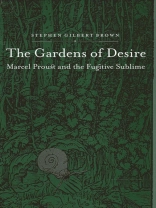The Gardens of Desire is at once a model of literary interpretation and a groundbreaking psychocritical reading of a literary masterpiece, Marcel Proust’s À la recherche du temps perdu (Remembrance of Things Past). Shedding new light on the origins of the creative impulse in general, and on the psychological origins of the Recherche in particular, the book illuminates the hidden associations between matricidal, suicidal, sadistic, masochistic, homoerotic, and creative impulses as manifested in Proust’s work. The book moves beyond traditional Freudian readings of Proust to consider the theories of Otto Rank, Jacques Derrida, and others, and provides provocative readings of the ‘privileged moments’ that comprise many of the work’s ‘critical cruxes, ‘ as well as a thought-provoking rereading of the novel’s ending. Both elegant and accessible, this book boldly explores the violence of desire as it relates not only to Proust’s narrator, but also to Proustian criticism itself, with its own violent desire to appropriate the essence of Proust’s masterpiece.
表中的内容
Acknowledgments
Introduction: Entering the Garden
1. The Kiss of Death: Desire in the Garden of Good and Evil
2. The Art of Sapphic Desire: The Curse of the Little Phrase
3. The Hymenoptera of Self and Other: The Making and (Un)Making of Knowledge
4. Three Moments of Desire: The Ideal, the Real, and the Remembered
5. Recherche and the Rankian Gaze
Conclusion: The Art of Madness
References
Index
关于作者
Stephen Gilbert Brown is Assistant Professor of English and Director of Composition at the University of Nevada at Las Vegas. He is the author of
Words in the Wilderness: Critical Literacy in the Borderlands and the coeditor (with Sidney I. Dobrin) of
Ethnography Unbound: From Theory Shock to Critical Praxis, both published by SUNY Press.












